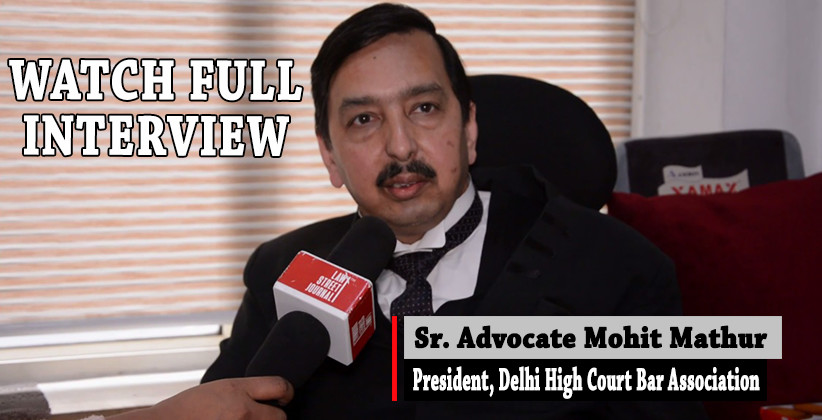On the 20th of February, in the Delhi High Court, it was seen that only urgent business was being conducted while most lawyers were abstaining from work in response to a call for protests given by the Delhi High Court Bar Association (DHCBA). The lawyers were seen protesting against the transfer of Justice S. Muralidhar, the third most senior judge in the Court to the Punjab and Haryana High Court (P&H HC). The Bar put forth the contention that such transfers via the collegium are not only detrimental to the noble institution but it further tends to erode and dislodge the faith of the litigants in the justice system. A fair delivery of justice is also impeded.
With regard to the above matter, answering questions on issues at hand, the President of the Delhi High Court Bar Association, Mohit Mathur in conversation with LawStreet Journal Editor Kshipra Srivastava:
LawStreet Journal:Transfers are a part and parcel of the Indian Judicial System. Then why do you think that the transfer of Justice Murlidhar from Delhi to Punjab & Haryana High Court is problematic?
Mohit Mathur: We are being misconstrued by everyone. There is no denying, transfer is the power vested with the collegium, to transfer any of these judges and even the constitution permits it from one High Court to another, neither do we say it is problematic. We have actually protested because the sentiment of the bar was that the Bar Association and the members of the bar who are primary stakeholders in any judicial system should have also been consulted where we could have expressed our views why a particular judge should or should not be transferred. So it is not a case or a situation where this protest is for an individual. Yes, no doubt he is one of the finest judges we have had in this High Court but moreover it is on the principle which is the issue today. The stakeholders should be taken in the loop while you are taking such an important decision of a judge who has been with the High Court, who has endeared himself to the lawyers, has encouraged the juniors, is a relief giving judge. Yes, those factors definitely weigh in the mind of the lawyers but more than that, it is the Supreme Court collegium that should have taken into account or kept the lawyers in the loop in the sense that the Bar Association views could have been taken and considered, the power of the pen is already with them.

LawStreet Journal:Is this the first time that Delhi High Court Bar Association has organised a protest?
Mohit Mathur:No, this is not the first time, it has happened before, when there is an attack on the judiciary in any manner, the bar associations all over the country have stood up. Even in this very High court, I am reminded of an incident in the 1980's where one of our judges, Justice T P S Chawla was not being considered for the appointment as the Chief justice of the High Court. The bar association took up the issue, and protested, the protest went on for days and the government paid heed to it, considered it and consulted the stakeholders, after which it appointed Justice Chawla as the Chief Justice of the Delhi High Court. So it is not something which is new.
LawStreet Journal:Has the Collegium acted outside the purview of its powers given by law?
Mohit Mathur:I won't say that, the collegium definitely has power and the collegium is the creation of a judgement of the Supreme Court wherein the court was developing the process for appointment of judges in the higher judiciary - in the HC and SC, which is why the collegium was set up. They have the powers and wisdom. Our protest is that, it is not an individual which is the issue, but the principle of involving the stakeholders.

LawStreet Journal:Is Justice Murlidhar aware of the ongoing protest?
Mohit Mathur:Justice Murlidhar was infact very candid and categoric that he wanted no protest to be lodged. His views were expressed in front of the entire executive committee. But the sentiments of the general members of the bar, we are around 20,000 members strong bar and the general sentiment of the bar was to lodge a protest and communicate the protest that the stakeholders should have been kept in the loop.
LawStreet Journal:If Justice Murlidhar is an asset for Delhi's Judiciary, why should P&H High Court not get the honor of working with him?
Mohit Mathur:They might definitely get the benefit of his indulgences because he is very good and encouraging. I am sure wherever he goes, he will be an asset. But I am sure you will appreciate and everybody will appreciate that why should I lose an asset for somebody else to gain an asset?
Author - Dyuti Pandya







